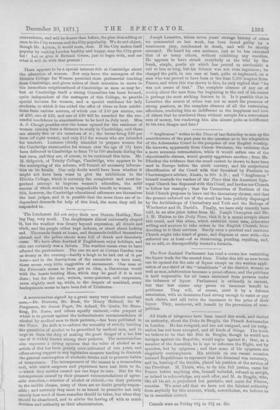Joseph Lemettre, whose seven years' strange history of crime we
commented on last week, has been found guilty by a unanimous jury, condemned to death, and will be shortly executed. He heard his own sentence, just as he has executed that of so many others, without exhibiting any emotion. He appears to have struck everybody at the trial by the frank, simple, gentle air which has proved so serviceable a veil to him so long, but his defence was not even ingenious; he charged the guilt, in one case at least, quite at haphazard, on a man who was proved to have been at the time 3,000 leagues from France, and when this was shown to him, he only replied that "he was not aware of that." The complete absence of any air of anxiety about the man from the beginning to the end of his career is perhaps the most striking feature in it. Is it possible that in Lemettre the source of crime was not so much the presence of strong passions, as the complete absence of all the restraining affections, rendering him so indifferent to the happiness sad love of others that he murdered them without scruple fora convenient sum of money, but rendering him also almost quite as indifferent to his own danger and fate ?


































 Previous page
Previous page